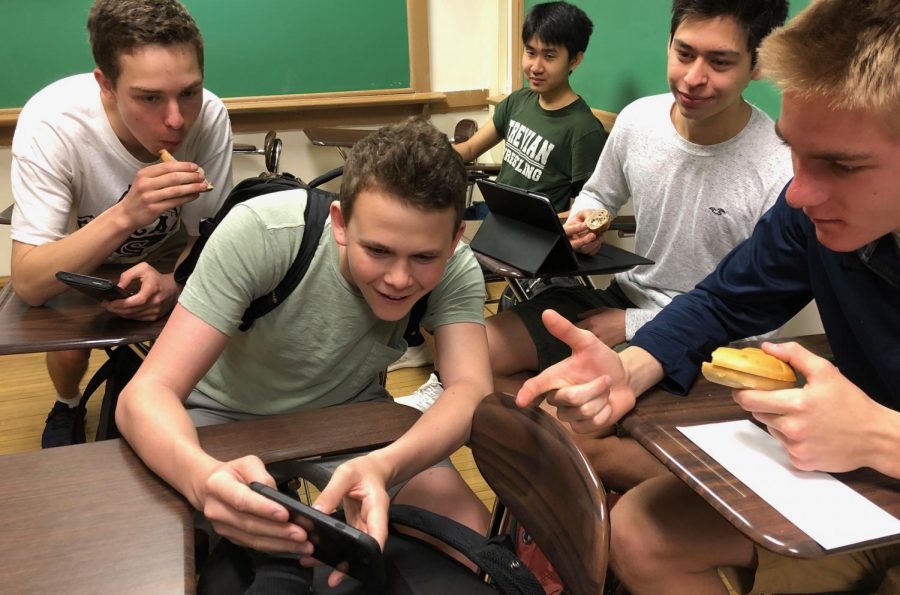Administrators consider advisery technology ban
Students critical of proposed device ban for next year
J. Keenan, T. Kamin, A. Kuhn, N. Lievano and N. Thammavijitdej share a laugh over a snapchat during advisery
For the upcoming 2018-2019 school year, it is possible that adviseries will see a no-technology policy instituted.
The administration is actively discussing a ban on personal device usage in advisery.
“We are seriously considering it,” said Assistant Principal for Student Services Scott Williams.
Currently, the use of technology by students at the Winnetka Campus in advisery is up to the adviser, similar to any classroom.
Some adviseries have unlimited use of smartphones, iPads, or laptops, but other advisers control the amount of time advisees spend on their devices.
Before making any decisions, said Williams, “We need to finalize some of our thoughts about it and communicate with advisers.”
One motivation for the change is to increase socialization between students with their peers and adviser.
“Adviser room is a place that can really facilitate lots of face-to- face conversations and connecting between students, not only with each other, but with their adviser,” said Junior Adviser Chair Patricia Sheridan.
“This is an opportunity for us to think about what amount of time is spent on phones in the building and what time is spent learning how to connect with other kids and socializing,” she said.
A no-technology policy could be the answer to increasing socialization within adviseries. The administration is also considering the change to help students’ mental health and wellness.
According to Sheridan, there is research showing that technology, especially social media, is having an impact on students’ feelings of happiness and connectedness to others.
“There are a lot of studies to suggest that empathy is lost when people are on their screens because you are not really connecting and not understanding how people are interacting around you,” said Sheridan.
By limiting the use of technology in advisery, there is a chance students will be impacted in a positive way.
However, some students are concerned about the possibility of a no-technology policy. Many use advisery time to finish homework, which often requires the use of iPads and laptops.
Junior Mia Papoutsis said she uses her technology for homework most mornings.
“If we couldn’t use technology, it would make me mad because I finish up homework in advisery,” Ssid Papoutsis. “If the school gives us iPads, we should be able to use them during our free time–like during advisery.”
Most students identified that the motivation behind a no-technology policy would be to increase communication among advisees. However, many of them felt that the policy would not help.
“By the time we get to this campus, we’ve played all the name games we need to play. Everyone knows each other. Taking away technology won’t change much in my opinion,” said Papoutsis.
Junior Pallavi Simhambhatla spoke to the potential benefits to students’ mental health if they cannot access their technology.
“Social media can change my mood for the worse. But I don’t think the 25 minutes of advisery without it is going to make a difference,” she said. “If students are going to use social media, they’re going to use social media. No one is going to suddenly become happier because they can’t see it during advisery.”
Advisers are torn when it comes to the policy. Many see the rationale for it, but are unsure how it will change the atmosphere of advisery.
“I can understand why they want to do it, but I think it will be a hard translation. I think grandfathering it in could make sense. But for me as a senior advisor it would be really hard to implement,” said KW teacher and adviser Lucy Riner.
Other advisers feel that a policy limiting devices is what is needed.
“I think by setting the standard to not have technology [in advisery] will allow teachers to let students use technology occasionally. We need to start from a total ban and come back from there. This is a step in the right direction,” said Spanish teacher and adviser Josh Sollie.









































